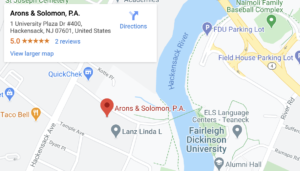New Jersey Divorce Lawyer

A divorce is one of the most stressful and emotional experiences you will ever face. It also involves serious decisions that will impact the rest of your life. You deserve an experienced advocate who will help you navigate legal hurdles and give you the legal guidance you need.
With over 150 years of combined experience, the family law and divorce attorneys at Arons & Solomon Divorce Lawyers help clients and families in New Jersey navigate difficult situations.
Contact our law office at (201) 487-1199 for a free consultation with a New Jersey divorce lawyer to discuss how we can help you.
Table of Contents
How Arons & Solomon Divorce Lawyers Can Help You with a Divorce in New Jersey

No one gets married with the expectation that the marriage will one day end. Even in the best-case scenario, divorce can be extremely emotional and difficult. When serious issues are contested such as child custody, a divorce can quickly become a contentious and expensive fight.
With high stakes and emotional distress involved, an experienced New Jersey family law attorney can help you fight for fair results and protect your best interests. At Arons & Solomon Divorce Lawyers, we understand that the results of a divorce case can have serious and lasting effects on an entire family. We have served New Jersey families with trustworthy legal representation since 1994.
We bring more than 150 years of combined legal experience to your representation. Mitchell Arons, Marion Solomon, and the rest of our legal team have earned numerous awards including the Martindale-Hubbell AV Preeminent rating, Top Lawyers of Bergen County by (201) Magazine, and the Bar Register of Preeminent Women Lawyers.
We also hold prestigious positions in New Jersey as the co-founders of the Collaborative Divorce Association of North Jersey.
Choose Arons & Solomon Divorce Lawyers, to represent you in your divorce and count on us to:
- Help you make difficult decisions
- Strive toward amicable resolutions with alternative dispute resolution
- Give you empathetic support at every stage of your case
- Commit the resources and time you need to achieve your goals
- Present a persuasive case to the court to help you achieve your goals in asset division, custody, and support
Contact our law office today for a free consultation with an experienced New Jersey divorce attorney ready to help you.
Overview of the Divorce Process in New Jersey

If you are contemplating divorce, it may help to understand the steps involved. In most counties in New Jersey, the filing party in an uncontested divorce will have to make at least one personal court appearance. In complex or contested divorces, multiple court appearances may be required.
The following are the steps for a contested divorce.
Step #1: Filing the Divorce Complaint
To begin divorce proceedings, one spouse must file for divorce with the court. The divorce complaint will include the grounds for divorce based on no-fault or fault. This spouse becomes the plaintiff.
Step #2: Answering the Complaint
The non-filing spouse, or defendant, will receive the divorce complaint. They can choose to respond to the complaint if they want the court to hear about any issues. A response can include filing a general appearance, an answer to the complaint, or a counterclaim the defendant wants to bring against the other spouse.
Separate procedures apply when the other spouse does not respond to the divorce complaint.
Step #3: Filing a Case Information Statement
Next, each party files a Case Information Statement or CIS. This contains each party’s relevant financial information that will be used to determine support and asset distribution.
Step #4: Reaching a Settlement Agreement
Both parties are encouraged to reach a settlement agreement. This may be done with the help of their divorce attorneys in New Jersey. If parties can agree, their attorneys will create a settlement agreement.
If a settlement isn’t reached, both parties must participate in an Early Settlement Panel. This panel is made up of family law attorneys who will try to help both parties resolve disagreements.
When the parties don’t accept the recommendations of the panel, they will participate in Economic Mediation. The next step is an Intensive Settlement Conference which takes place in the courthouse.
Step #5: Trial
When an agreement still isn’t reached, the divorce continues to trial. A judge may order appraisals of property and it may take months before the case is actually heard. A judge will be in charge of deciding issues that are disputed. When the trial is complete, the court issues a Final Judgement of Divorce and the divorce is complete.
Uncontested Divorce Process
An uncontested divorce is far simpler. A complaint for divorce is filed with the court and a docket number will be assigned within one to two weeks. The other spouse will be served with papers.
If the other spouse accepts service, they can be notarized and filed with the court. The court will review all paperwork and issue a Notice of Court Date. On that date, the court will rule on the complaint for divorce and the divorce can be granted that day.
What Is the Difference Between a Contested and Uncontested Divorce in New Jersey?
A divorce can be very straightforward and even fast when both parties agree on all terms. On the other hand, divorce can also take many months or even years when there are disputes.
In the state of New Jersey, a divorce can be contested or uncontested. When a divorce is contested, it means one spouse does not agree with the other on any important terms like child support, child custody, alimony, or property division. All attempts must be made to resolve a contested divorce through negotiation, mediation, or arbitration. If it cannot be resolved, it proceeds to a trial.
In a contested divorce, a trial is held in the Family Division of the Superior Court. Both sides may present evidence and argue their positions with issues decided by a judge.
Ideally, both parties can reach an agreement and avoid the cost and emotional upheaval of a trial. Negotiation or alternative dispute resolution with a New Jersey divorce attorney, or privately between both parties, can allow a divorce to proceed uncontested.
Is New Jersey a No-Fault State for Divorce?
In New Jersey, there are many possible causes of action for a divorce. In a no-fault divorce, there are two grounds for action. There are also seven grounds for fault divorce.
When a no-fault divorce is filed, it means the spouses have irreconcilable differences or are separated. To file on the grounds of separation, the spouses must have lived apart and separately for 18 consecutive months or longer without a prospect of reconciliation.
To file a no-fault divorce based on irreconcilable differences, you must show that the marriage has irreconcilably been broken for at least six months with no reasonable hope of reconciliation.
With a no-fault divorce, neither party is blamed for the breakdown of the relationship. It is not necessary to prove any wrongdoing. This type of divorce can still be granted, even if the other spouse does not want to divorce.
Most New Jersey divorces are no-fault. Fault-based grounds for divorce are rarely used but include adultery, extreme cruelty, and imprisonment. Each requires proving the element for the cause of action.
Are There Residency Requirements for Divorce in New Jersey?
There are residency requirements to file for divorce in New Jersey. This is the minimum amount of time a spouse has lived in New Jersey before filing. At least one spouse must have lived in the state for at least 12 months before filing for divorce in New Jersey. This requirement is only waved in adultery-based fault divorce as long as one spouse lives in the state.
How Are Assets and Property Divided in a Divorce in New Jersey?
New Jersey uses an “equitable distribution” concept to divide assets in divorce. This means that the division of assets should be fair, but it will not necessarily be equal. Equitable distribution can be more complex than a 50-50 division in a community property state, but it may also be in the best interests of both spouses.
All types of assets can be distributed under an equitable plan. This includes bank accounts, investment accounts, pensions, the marital home, real estate, businesses, and vehicles. Only property that is considered marital property is subject to division. This refers to property acquired during the marriage.
A court has broad discretion when determining how assets will be fairly distributed.
They may consider factors such as:
- The length of the marriage
- The health and age of each spouse
- The standard of living in the marriage
- Each party’s economic circumstances, work history, and earning capacity
- Whether a spouse delayed pursuing a career to further the interests of the marriage, raise children, or support the other spouse
- Which spouse will have physical custody of children
Additional criteria the court may consider during equitable distribution is listed under N.J.S.A. 2A:34-23.1.
For instance, if one spouse will have physical custody of minor children, they may be awarded the marital home. To ensure an equitable distribution, other assets may be awarded to the other spouse to offset this such as savings or a pension. If one spouse has a high net worth that was not earned during the marriage and significant earnings, the other spouse may be awarded a disproportionate amount of marital assets.
We Can Help with Every Aspect of Your New Jersey Divorce
Even a seemingly straightforward divorce can be complex. It is also common for a divorce to begin amicably and without dispute but become a contested divorce when parties cannot agree on serious issues.
A NJ divorce lawyer at Arons & Solomon Divorce Lawyers can help you with every aspect of your divorce:
- Property division
- Spousal support
- Child support
- Child custody and parenting time
- Alternative dispute resolution including mediation, arbitration, and collaborative divorce
- Divorce litigation
- Domestic violence issues
- Prenuptial agreements
- Parental relocation
We will serve as your advocate to protect your best interests and seek a fair resolution to your divorce. We strive to resolve divorce disputes in a manner that is fair to both spouses and less time-consuming and costly than litigation. We represent clients in all types of divorce issues including contested and uncontested divorce, post-divorce issues, military divorce, and LGBT divorce.
Schedule a Free Consultation with a New Jersey Divorce Lawyer
Divorce is already an emotionally challenging experience. When you are facing serious issues and disputes, you deserve experienced legal counsel to make sure you are protected. Arons & Solomon Divorce Lawyers, will serve as your advocate during this difficult time to make informed decisions about your future.
Contact our law firm today for a free consultation with a New Jersey divorce lawyer to discuss your case and how we can help.
New Jersey Divorce Testimonial

https://goo.gl/maps/5umGGNWKW2qVKneF6
New Jersey Courts
- Camden County Courthouse – 101 S 5th St, Camden, NJ 08103
- State of NJ Judiciary Department – 928 Livingston Ave, North Brunswick Township, NJ 08902
- Superior Court Appellate Division – 583 Newark Ave, Jersey City, NJ 07306
- Superior Court of New Jersey – 50 W Market St, Newark, NJ 07102
*Disclaimer – we do not endorse these companies or profit from having them listed on our website.


